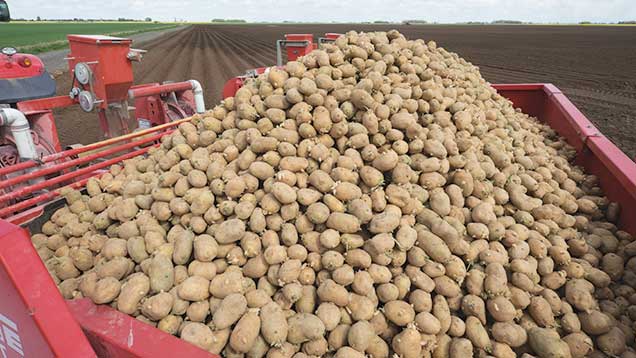How to avoid damaging glyphosate drift into seed potato crops
 © Tim Scrivener
© Tim Scrivener Sprayer operators need to avoid spray drift when using the non-selective herbicide glyphosate near seed potato crops to stop costly damage to tubers.
Ther is a risk of glyphosate contamination of seed crops escalate as growers use the product to desiccate oilseed rape and cereal crops.
Seed potatoes are very sensitive to glyphosate, with any crop contamination from spray drift or contaminated sprayers affecting developing seed.
When those tubers are planted in the following season, poor establishment or partial crop loss can occur at a large cost to both seed and ware potato growers.
See also: Irrigation investment helps salad potato business thrive
Independent potato consultant Stuart Wale, who has been an expert witness in many cases of glyphosate contamination insurance claims, tells Farmers Weekly that direct drift is the main cause of damage.
Position of seed crops
AHDB Potatoes has worked with AHDB Cereals and Oilseeds, SAC Consulting and Scottish Agronomy to produce best-practice guidance for farmers and sprayer operators when using glyphosate near seed crops.
You can download a free copy from the AHDB Potatoes website.
You need miniscule amounts of active and sometimes you won’t see any signs until you get problems with the planted seed.
It is not just direct drift that causes problems, as thermal convection currents can pick up spray particles and deposit chemicals over big distances.
Dr Wale advises seed growers to talk to nearby farmers, landlords and their sprayer operators to ensure they know the position of seed crops.
Sprayer operators should check the wind direction and leave adjacent headlands unsprayed.
Historic cases of glyphosate damage have, in the worst instances, proven very costly, with lengthy disputes and insurance claims running into hundreds of thousands of pounds.
Insurance obligation
Jason Cockerill, accountant with Yorkshire-based seed potato producer James Stockdale, says under the British Potato Trade Association terms and conditions for the purchase and sale of seed potatoes, they are liable for any damage in the seed they produce.
This liability equates to six times the original cost of the seed, often in the region of £250/t, even though the damage has been caused through no fault of their own.
Mr Cockerill adds seed producers are obliged to have insurance to cover this liability, as it is difficult to prove the source of damaging glyphosate drift.
However, it is becoming increasingly difficult to get insurance against glyphosate damage, with NFU Mutual the only company willing to provide cover.
“Many people outside the seed industry are unaware of the issue and we need to educate and communicate the implications of glyphosate contamination in seed potato crops.
“Everyone spraying glyphosate must share the responsibility. They are only doing what’s best for their own crop, but they need to be aware of the effect it can have on ours,” he explains.
